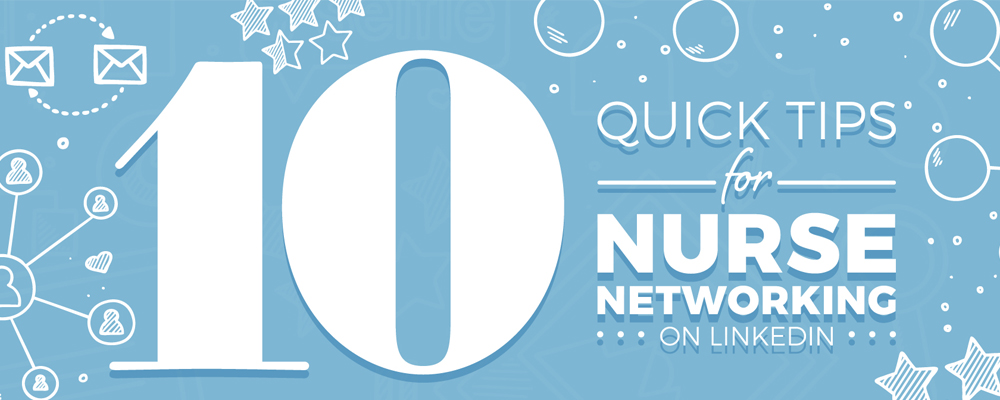Click here to see our full infographic
Once upon a time, landing a nursing job was a fairly straightforward affair. You spruced up your resume or CV, applied to an advertisement, put your best professional self forward during an interview, and handed over your references. You might have been rewarded for your effort with not only a job, but a sign-on bonus, as well. In times when nurses were in particularly short supply, such as during the late 1980s, you might even have scored a bonus just for showing up for an interview, regardless of whether you were even offered a job.
Of course, RNs’ roles and responsibilities have changed dramatically since then, and so have healthcare organizations’ hiring needs. Increasingly, complex healthcare systems and procedures require nurses with equally complex skill sets — and not only clinical skills, but technological and culturally competent ones, too. And hospitals and other healthcare facilities, striving for excellence in both clinical care and customer service, place a heavy burden on RNs as frontline caregivers, to help bolster patient satisfaction scores.
A resume, no matter how well it’s crafted, might not check off all the boxes on a healthcare employer’s must-have list. Clinical skills are vitally important; but recruiters also look for qualities that demonstrate a job candidate has the integrity, stamina, and outlook that will fit within their organization’s culture.
Nurses often overlook an important element of a successful job search, one that works in tandem with a resume and cover letter but brings out a candidate’s professional demeanor, which is often hidden between the lines.
Nurses need to network.
Why Networking?
There are plenty of career-oriented reasons nurses should participate in professional networking, but the bottom line is you’ll be more likely to get hired. By some estimates, 80% of all jobs are obtained through networking. Other research puts the percentage at 85%.
Plus, healthcare recruiters prefer employee referrals, which are, more often than not, tied to networking. According to LinkedIn, research shows job candidates referred by current employees or others connected to an organization offer recruiters a less expensive and faster way to hire. Referred employees also tend to onboard faster and stay in the job longer.
Even if you’re not on the hunt for a new nursing job, networking contributes to career advancement. Who you know can make a difference if you’d like to change your specialty or if you’d like to find and participate in research activities. Networking helps keep you informed about trends and advancements in your field, and it provides a valuable professional peer support system that can enhance your job satisfaction.
Professional networking might not come easy to nurses. Many, in fact, view it as an activity suited more to business people than clinicians. Some RNs react with discomfort to the very idea of seeking out people for the sole purpose of furthering their own career goals. To them, the activity feels self-serving.
Successful networking, however, amounts to a two-way street. Building professional relationships with others can be (and should be) a mutually beneficial pursuit. As much as you gain from connecting with, say, a former colleague or classmate, that person also will take something away from his or her association with you. With networking, knowledge can be shared, reference lists built, and favors returned.
While professional conferences remain a mainstay of networking for healthcare professionals, social networking using digital platforms, such as LinkedIn, makes the process of connecting and interacting with others easy and efficient. It’s also less time consuming than, for example, waiting in line to speak with a healthcare representative in a conference booth; and it’s far less daunting than approaching a speaker following a keynote address.
Why LinkedIn?
Professional nursing associations offer opportunities for nurses to network with other nurses, particularly within specialties. A number of social sites provide networking experiences specifically geared to the nursing community, from Q&A-based sites such as AllNurses, to career management forums like BluePipes. RNs will also find numerous nurse-oriented groups on Facebook and Twitter, although currently it can be a hit-or-miss proposition on these platforms to discover groups that will be helpful to your job search or professional development.
LinkedIn, on the other hand, is clearly the top dog of social networking platforms for professionals. It boasts more than 500 million users worldwide, including millions of nurses and physicians. As a platform dedicated to career-minded individuals, LinkedIn serves as a resource for nurse recruiters, who routinely use it to search for and vet potential nursing job candidates.
With LinkedIn, you can search for jobs and also open your profile to be searched as a potential job candidate. You can use the platform to request recommendations and prepare for an interview by viewing the profiles of a prospective employer. If you know the names of your interviewers ahead of time, you can also investigate their LinkedIn profiles. Knowing the background and interests of your interviewer can help you establish rapport and project a good first impression at the start of an interview session.
A powerful research tool, LinkedIn can even serve as your go-to resource if you’re vying for a promotion or considering a specialty switch. Use it to view the profiles of RNs in positions similar to the one in your sights, and you’ll gain valuable insight into the qualifications, skills, and characteristics needed to be successful in a new nursing job.
As your network on LinkedIn expands, so, too, do your opportunities to broaden your knowledge base. The platform encourages you to connect with groups that share your interests. Within groups, you can give and get advice, stay up-to-date on the latest developments in your field, share your expertise, and build professional credibility.
How to Network on LinkedIn
If you’ve followed our tips for setting up or updating your LinkedIn profile, you’re ready to begin using the platform to network with others. Bear in mind that having a profile in place is not enough to fully benefit from the site’s networking capabilities. Too many nurses make the mistake of creating a LinkedIn profile and letting it sit there. The problem with that approach is your profile will do just that: passively sit there. Networking requires actively connecting with people, whether it’s current or former work associates, former classmates, or groups relevant to your career interests.
When you interact with someone on LinkedIn — the platform refers to these individuals as “connections” — you’ll not only establish your professional relationship with that person, but you’ll also gain access to an extended network of people whom each of your connections know. LinkedIn connections come in degrees, such as 1st-, 2nd-, and 3rd-degree connections. The LinkedIn Help function offers explanations and tips for creating and maintaining connections.
Like traditional networking, building connections on LinkedIn is an active pursuit. The more you put into networking on the platform, the more you’re likely to gain from your efforts.
Download our infographic for 10 Quick Tips for Nurse Networking on LinkedIn, and you’ll soon establish a robust system of professional contacts.
And don’t forget to follow Eisenhower Health on LinkedIn, where you’ll gain valuable insights into our award-winning medical center, view outstanding job opportunities, and keep apprised of the latest healthcare news. Or visit our active Careers page on the web.
Originally posted on 7/25/2017




